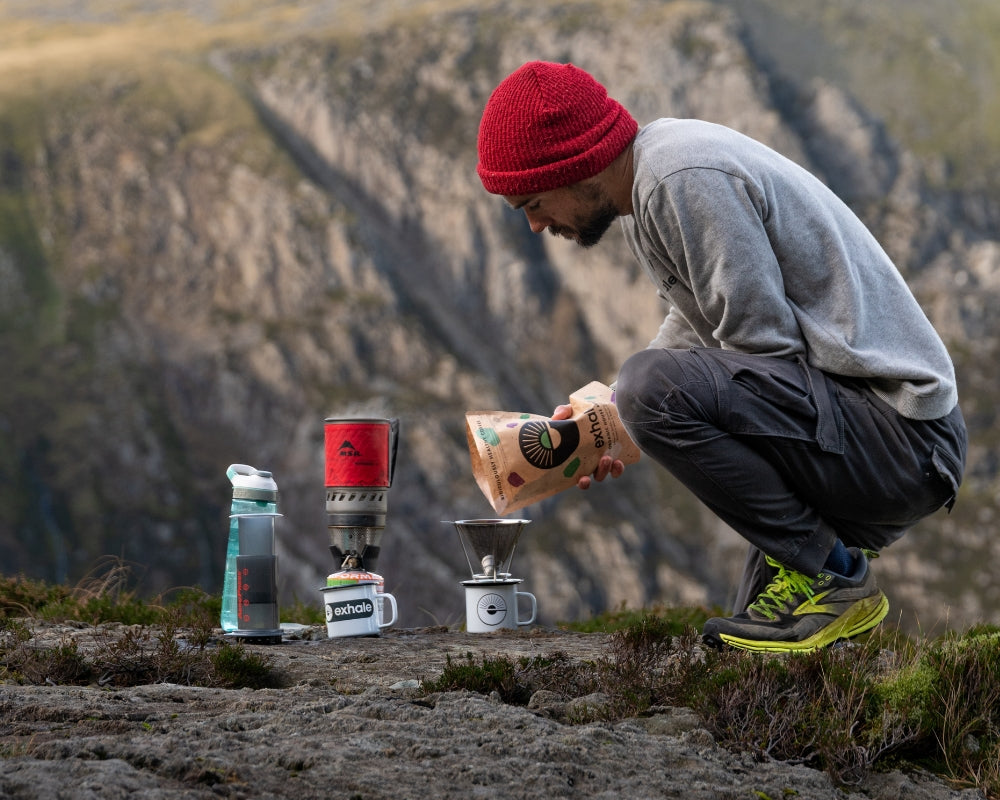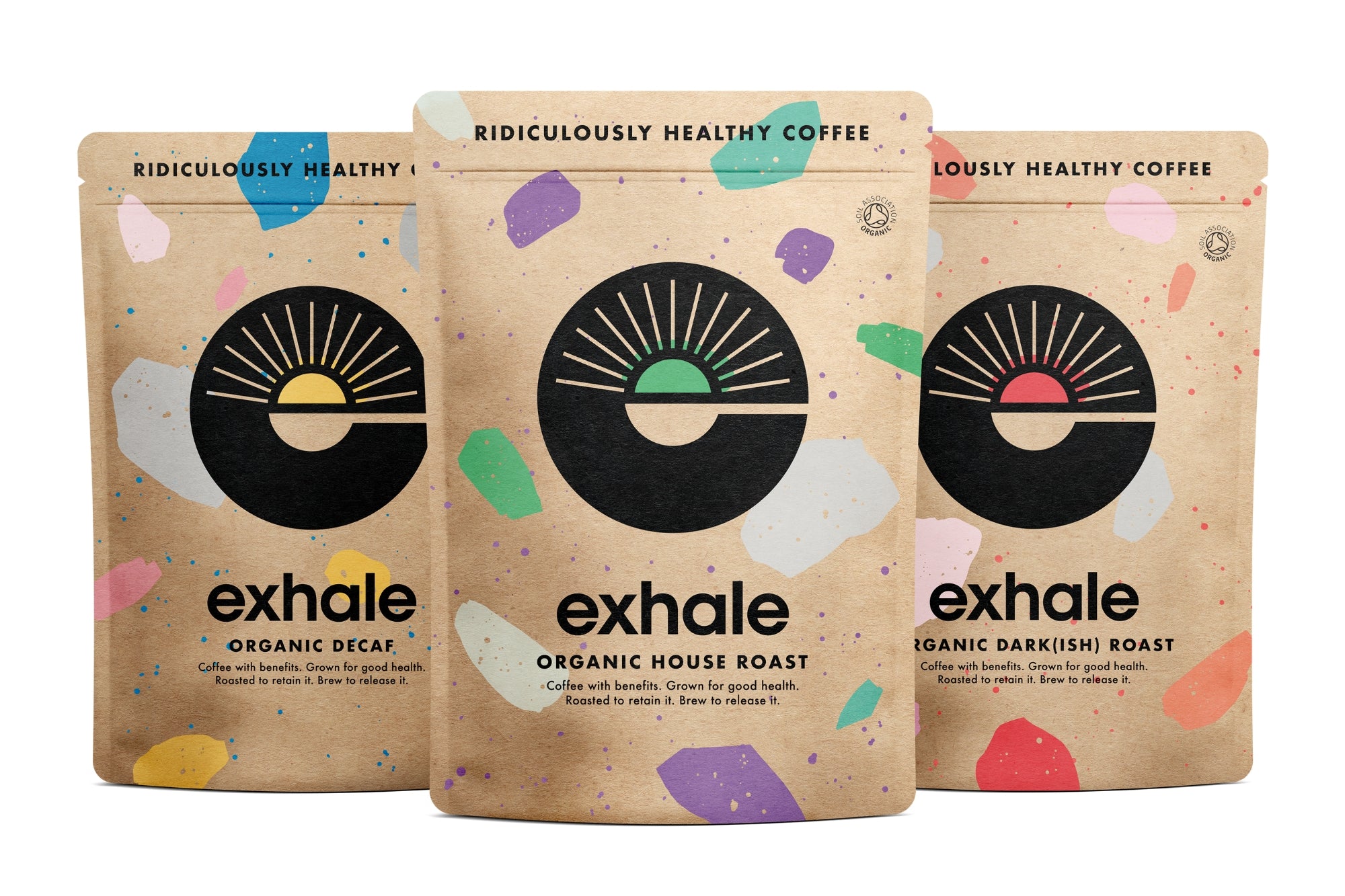Coffee is one of the most popular beverages in the world and because of that it’s one of the most studied, with hundreds, if not thousands, of new studies published every year.
In the last 10-20 years the scientific opinion on coffee has turned from it being a guilty treat with adverse health implications to being something which can support a healthy lifestyle with an array of different health benefits.
One study published in June 2020 even concluded that ‘Coffee may be viewed as a healthy vegetable food’! (1)
Read our article for more on how coffee beans are actually seeds that grow in a fruit and as such, if treated right, can have similar health benefits.

But how much coffee should you drink to get the maximum health benefit? Can you drink too much? And can it be decaf?
What are the health benefits of coffee?
In 2016, the World Health Organisation reversed its stance on coffee being a possible carcinogen to say it either has nil effect or can even ‘reduce the risk of 5 types of cancer’.(2)
But the crowning year for coffee was in 2017 when the British Medical Journal (BMJ) published an umbrella review on coffee covering 218 meta-analyses of both observational studies and randomised controlled trials (i.e. it was pretty thorough!). (3)
It showed that
‘coffee is good for almost everything, as long as you aren’t pregnant’. (4)
Specifically, it concluded that coffee drinkers have a huge 17% lower risk of death from any cause (‘all-cause mortality’) vs those who didn’t drink coffee!
High vs low coffee consumers had a significantly reduced risk of contracting some of the world’s worst diseases including a 30% reduced risk of Type 2 Diabetes, 50% of Liver Cancer, 65% of chronic liver disease, 36% of Parkinson’s Disease, 37% of Leukemia to name a few.
According to a related BMJ article, in 2017 (5).
‘Scientists woke up to coffee’s benefits’

Our mission at Exhale is to help the general public wake up too.
One way we do that is by sharing all the latest research and advice on coffee and health in our weekly email newsletter so if you don’t receive it already, sign up to it in our footer below.
Note, that as most of these studies were observational in nature, they do not prove that coffee caused the reduction in disease — only that coffee drinkers were less likely to get these illnesses.
How much caffeine should you drink?
Before we discuss how much coffee you should drink for maximum benefits, we need to untangle the conversation from that of how much caffeine you should drink. Because the two are very different.
The BMJ review mentioned above showed coffee drinkers have a 17% reduced risk of death from any cause. But
that was the same for decaf drinkers showing there are considerable health benefits to drinking either regular or decaf coffee.
Whether you choose to get those health benefits from drinking regular coffee or decaf is entirely a personal preference and will mostly be dictated by your genetic makeup.
There are two main genes which dictate how much caffeine you can tolerate. They affect how fast you metabolise and how well you absorb caffeine. Some people can tolerate a lot, and some very little. But most people lie somewhere in the middle.

If caffeine makes you feel anxious or jittery, try a high polyphenol coffee like Exhale because polyphenols have been shown to be anxiolytic (reduce anxiousness) and can counter some of the negative effects of caffeine.
Read our blog for our top 5 ways to ease caffeine jitters. Many people who couldn’t previously drink regular coffee can drink Exhale, just check out our Trust Pilot reviews.
But if you’re highly sensitive to caffeine you may want to drink only decaf. Decaf still has most of the health benefits of regular coffee. Read more about decaf in our blog ‘What’s the deal with decaf?’.
You could also try drinking a half-caf. This is where you mix half regular and half decaf coffee for half the caffeine. Our House Roast, Dark(ish) Roast and Decaf all come from the same bean on the same farm so mix really well together.
You should also consider the timing of caffeine. A good night sleep is the pillar of all health and drinking caffeine too late in the day could disrupt your sleep. There is no hard and fast rule as to what time you should stop drinking caffeine (despite what some people say!) and you should listen to your own body.
If you go to most Blue Zones in the world you will find centenarians drinking coffee until late into the evening while living the sort of life most of us dream of until 100 years old or more. So again, don't simply listen to whoever shouts the loudest, listen to your body!
If you wake up in the night or take a long time to get to sleep, try moving your last coffee an hour earlier, then two hours etc.. until you find your own sweet spot.
Equally, coffee takes a lot of flack for disrupting sleep when it’s so much more complicated than that. Watching zombie movies on Netflix, hyper stressed, while doom scrolling on Instagram then expecting to nod off immediately is also pretty unrealistic!

Listen to your body, it will quickly tell you when you’re getting it wrong.
I have learnt, through my 20 years of drinking coffee, that I’m a slow metaboliser of caffeine. That means I can fill my boots in the morning and don’t get any anxious feelings at all. But if I have a coffee in the afternoon, it keeps me up at night. So I stop drinking caffeine by 1pm and either have a decaf in the afternoon, or if I really need a little caffeine, I have a half-caf.
By now most of you reading this blog have probably been drinking coffee for many, many years so should know roughly what time of day to stop drinking coffee.
For the purpose of this blog, assume caffeinated coffee and decaf are interchangeable and you can swap one for the one depending on your own circumstances.
How much coffee should you drink for maximum health benefits?
Now on to the crux of the blog!!! How much coffee (regular or decaf) should you drink each day to get all these wonderful benefits?
Healthline is often a balanced, consumer-friendly place to start any research. They conclude that -
“Coffee consumption has been linked to a reduced risk of many diseases, with the greatest effects seen at around 4 to 5 cups per day.” (6)
Let’s see what my favourite British Medical Journal review discussed earlier says:
The “largest risk reduction for various health outcomes is 3 to 4 cups a day”.

Since that was published in 2017, more recent studies also support this as being the optimal range for most conditions (7, 8, 9).
For ‘most’ conditions.
There do, however, appear to be instances where more coffee is more beneficial. For example the research on Type 2 Diabetes shows that
every additional cup of coffee drank in a day reduces your risk of Type 2 Diabetes by a further 7%! (10)
But conversely, as quoted from the BMJ report earlier in this blog “Coffee is good for almost anything, unless you’re pregnant” so the quoted 3-5 cups a day isn’t for everybody. (4)
Incidentally, if you are pregnant and wondering, the government guidelines recommend a maximum of 200mg of caffeine a day while pregnant and we stand by that. That's 1 small cafetiere of Exhale coffee exactly. But really, do what you feel comfortable with, or makes you happy, as I know plenty who cut it out entirely.
How confident can you be in your ‘dosing’?
While there does seem to be a consensus that 3 to 5 cups a day of coffee is the optimum, what isn’t clear is how big those cups are and it varies between studies, if it’s stated at all.
Also, in reality, there are dozens of different methods of brewing coffee (how many have you got sat on your kitchen shelf?!) and within each method there are infinite different recipes using those methods.

The studies quoted above also look at average coffee. However, there is a massive variability in the concentration of coffee’s healthiest compounds from coffee to coffee.
Studies show a 31-fold difference between the highest and lowest concentration of polyphenols (Chlorogenic Acid/CGA) in brewed coffee! (11)
So, 3 to 5 cups of a high CGA coffee is very different to 3 to 5 cups a day of a low CGA coffee. Just as 3 to 5 cups of cafetiere coffee stewed for 10 minutes is very different to 3 to 5 cups of under-extracted filter coffee brewed with too short an extraction time.
So, you can't be confident at all that you're getting the optimal dose of the health promoting compounds in coffee needed to get it's fantastic array of health benefits... unless you drink a lab tested coffee like Exhale of course!
Conclusion and our recommendation
Following the consensus in the research, to gain the maximum health benefits from coffee, the optimal ‘dose’ is 3 to 5 cups a day.
A 'cup' as referenced in a study doesn't mean a tanker-sized mug of coffee we've become accustomed to drinking in the UK. In general, their 'cups' are around 200ml, so an average 300ml mug is the equivalent of roughly 1.5 ‘cups’ of coffee.
So 1 small cafetiere producing 300ml of coffee is around 1.5 cups. And 1 AeroPress, 1 dripper, or 1 double espresso is likely to be the same.
Based on the available research, and based on the types of coffee most people drink at home vs in a lab,
our recommendation at Exhale is to drink 2-3 cups/mugs a day brewed in a small cafetiere, a steel reusable dripper, a moka pot, an AeroPress with metal filter or equivalent. Or 2-3 double espressos a day.

If those mugs are of a lab tested, organic coffee that’s optimised for high levels of polyphenols, like Exhale Healthy Coffee is, then even better.
If you're using a steel filter instead of a paper one then it's a double-win. Read why it’s healthier to use a steel filter instead of a paper one in our article 'It's time to ditch the paper filters'.
Whether they are caffeinated, or decaf is up to you. But personally I drink 2 mugs of our Organic House Roast or Organic Dark(ish) Roast in the morning then have a third mug of either half-caf or our Organic Decaf in the afternoon.
And there you have it!
One 450g bag of Exhale Healthy Coffee provides 30 cups (mugs) of coffee. If you're aiming for the optimal 2-3 cups a day of coffee to maximise the health benefits, then you should be drinking one full bag on your own in 10 days to 2 weeks.
Please let me know your thoughts in the comments below. Are you already drinking this amount? Or did you think coffee was a guilty treat and so should be drank more sparingly? And if you know any doubters out there please forward this article on to them as I love a bit of healthy debate!
Al x








12 comments
Taylor Catrina
Hello. I’ve been on your coffee for 4 days now. Is it meant I send you to the toilet within 5 minutes of drinking it as it does every time I have a cup. Or does that mean I’m allergic to it? Thanks
Mychel Deyna-Hayward
And exhale… I can’t tell you how excited I am to receive my free trial of darkish & 40% off house roasts. As a woman currently unable to work, due to injury & medical conditions, budget is as important as optimal health benefits, however, reading your journals & articles, I feel confident that purchasing a coffee I not only like the taste of, that does me good, makes exhale a pretty strong investment, especially as all instant coffee is now expensive. My question is this. If one is lucky enough to have an instant hot water tap, is that regarded as boiling? Will it burn my coffee from tap to cafetière? Do I let it cool for 30 seconds or 1 minute?
Thank you so much in advance x
Elizabeth Orlic
Hi
What kind of benefits would you notice in how much time ?
In 2 month , 2 cups of coffee every day ? Would it make you feel better , like, more energy, better skin or something else ? Because, if you eat 1kg of kale daily or 8 punnets of bluberies surely would would notice some difference. Also how many “bluberies” are in small cafeteria?
Elizabeth
I have a Hotel Chocolat Velvetiser, which is lovely for comforting frothy drinks especially at this time of year!
I presume your coffee would also work well in a Velvetiser but thought I’d check first for any tips. Presuming also that you would need to brew the coffee first in a cafeteria and then add to the milk before whisking up?!!
Kind regards, Elizabeth
Jesse
Hello there! From a Fellow Coffee Lover. I’ve been thinking about the health implications lately. Then i discovered this blog, which greatly improved my comprehension. Thank you for sharing. I also happened upon another webpage that addressed the same topic.
https://menuwars.com/food-blog/is-coffee-good-for-you/
Leave a comment
All comments are moderated before being published.
This site is protected by hCaptcha and the hCaptcha Privacy Policy and Terms of Service apply.